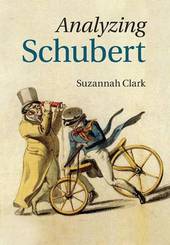
|
Analyzing Schubert
Paperback / softback
Main Details
| Title |
Analyzing Schubert
|
| Authors and Contributors |
By (author) Suzannah Clark
|
| Physical Properties |
| Format:Paperback / softback | | Pages:302 | | Dimensions(mm): Height 246,Width 172 |
|
| Category/Genre | Music
Theory of music and musicology
Romantic music (c 1830 to c 1900)
Bands, groups and musicians |
|---|
| ISBN/Barcode |
9781316620755
|
| Classifications | Dewey:780.92 |
|---|
| Audience | | Professional & Vocational | |
|---|
| Illustrations |
87 Printed music items; 1 Tables, black and white; 1 Halftones, black and white
|
|
Publishing Details |
| Publisher |
Cambridge University Press
|
| Imprint |
Cambridge University Press
|
| Publication Date |
1 September 2016 |
| Publication Country |
United Kingdom
|
Description
When Schubert's contemporary reviewers first heard his modulations, they famously claimed that they were excessive, odd and unplanned. This book argues that these claims have haunted the analysis of Schubert's harmony ever since, outlining why Schubert's music occupies a curiously marginal position in the history of music theory. Analyzing Schubert traces how critics, analysts and historians from the early nineteenth century to the present day have preserved cherished narratives of wandering, alienation, memory and trance by emphasizing the mystical rather than the logical quality of the composer's harmony. This study proposes a new method for analyzing the harmony of Schubert's works. Rather than pursuing an approach that casts Schubert's famous harmonic moves as digressions from the norms of canonical theoretical paradigms, Suzannah Clark explores how the harmonic fingerprints in Schubert's songs and instrumental sonata forms challenge pedigreed habits of thought about what constitutes a theory of tonal and formal order.
Author Biography
Suzannah Clark is Gardner Cowles Associate Professor of Music at Harvard University, Massachusetts. In addition to her work on Schubert, her research interests range from medieval French motets to the history of music theory from Rameau to Schenker. She is the co-editor of Citation and Authority in Medieval and Renaissance Musical Culture: Learning from the Learned, with Elizabeth Eva Leach, and Music Theory and Natural Order from the Renaissance to the Early Twentieth Century, with Alexander Rehding.
Reviews"The result is a book that not only offers new ways of understanding Schubert's music but critiques music theory itself, inviting further questioning of long-accepted assumptions. This work is a fascinating challenge..." --Choice "Recommended for all lovers of Schubert for sure; but also to anyone with more than a passing interest in the development of harmony in particular in the nineteenth century, and indeed musical history more generally." --Classical.net "Analyzing Schubert certainly is controversial, particularly in Clark's critiques of well established theories, but it is sure to provoke further discussion on music theory's role in understanding music." --Music Research Forum (Volume 27,2012)
|